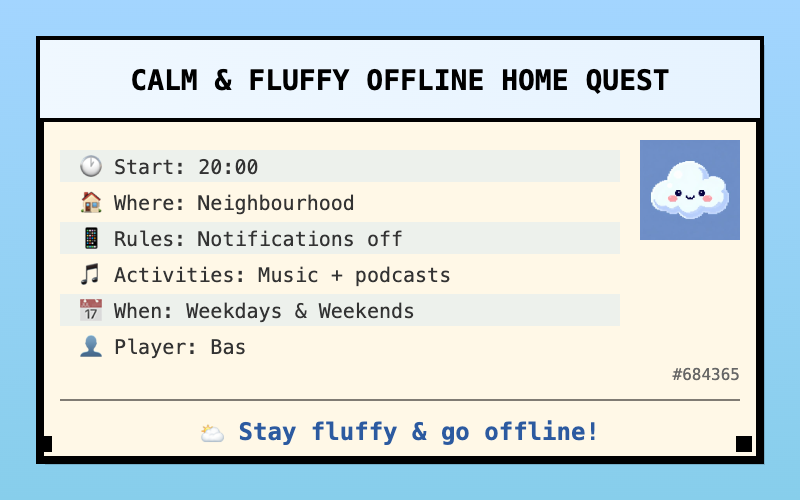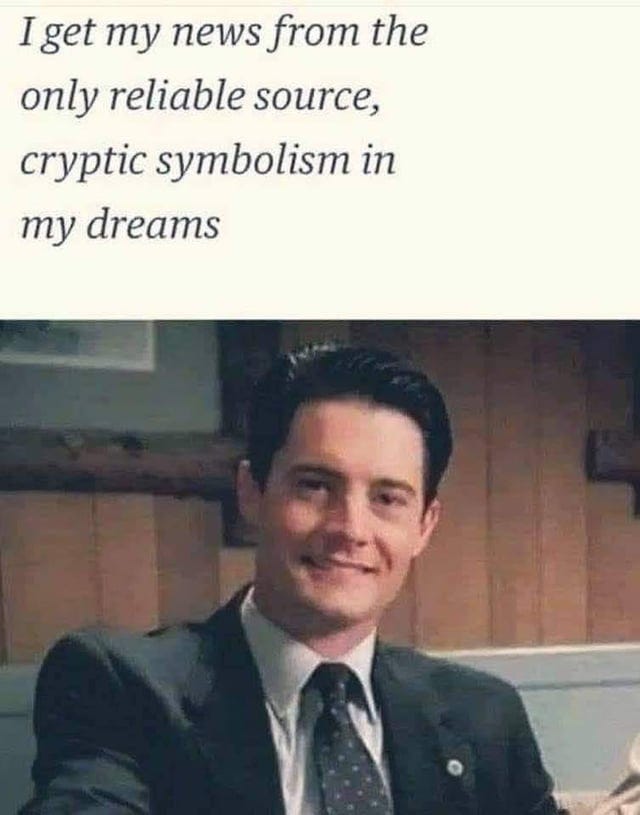Offline after 8pm for 30 days: what sucked and what stuck
Thirty nights of almost doing what I said I’d do.
Can I go offline after 8pm for an entire month? That was the question I asked myself, and now I have an answer. With one more day to go, it’s time for a recap and reflection.
The challenge
Earlier this year I ran an experiment in which I left my phone at home whenever I’d go out. It was challenging, fun, and wholesome. I did not get bored, and everything was much more manageable than I expected.
For the month of October, I wanted to do an inverted version of the same challenge: can I go offline at home after 8pm?
My rules were: no notifications in the evening, no TV shows, no video games, or other digital media besides music and podcasts. If you’d like, you can go back and read more here:
The first difficulties
I almost immediately ran into things I didn’t consider before starting the challenge.
I’d go to a dance or yoga class with a friend at 6pm. This means I’d leave the house at 5.30pm and return around 8pm. The end result: I’d be offline and unreachable for 14 hours at a time, multiple times a week.
That’s not always convenient, so I’d want to quickly check my messages before “offline time”. Do I do that at the studio? Do I ask my friend to wait, since we’re cycling in the same direction? Or do I hang out in the street to get my online-fix before I go into my building?
It felt like the online world forced itself into my life more that way, instead of less.
So I broke my rules.
Or rather, I made a new one.
I’d allow myself a 5-minute window in the evening to quickly settle a few things if I’d been out before.
That worked quite well and is something I’ll keep doing from now on (probably in the form of using my phone just briefly, once per hour, after dark).
What sucked
As the month progressed, I found the experiment much more challenging than my no-phone experiment. The way I had set it up, basically meant that I wouldn’t look at screens after 8pm.
Seemed easy. I enjoy spending vast amounts of time by myself, in my own head.
I currently live alone, mostly work from home, and might see friends a few times a week, if that. I’m comfortable with that. I used to move around a lot between countries, so I had to learn to enjoy my own company and that of friends who might not be in the same city.
However, ripping the prime time of the day during which I communicate with some of my friends was quite an isolating experience, especially without anything to put in its place besides reading and cooking.
So, after a week, I switched out of monk-mode, allowing myself to watch Twin Peaks to finally see what the fuss is about.
The lesson learned is that I may need a few more offline hobbies so that I can switch it up more easily in the evenings.
Eventually, I also ended up shifting from 8pm to a looser 9-9.30pm so that I could communicate with some friends in the evenings.
By deviating from the original constraints of the experiment, I found a new rhythm for myself that I intend to nurture.
What stuck
Despite the changes, some things stuck almost immediately.
After that first week of being fully offline in the evenings:
I still ignored all notifications in the evenings.
Or rather, they were muted. I often enter focus mode for work, where I mute everything, so I can get stuff done. Having a daily ritual in which I treat my free time the same way has become so worthwhile.No more ‘procrastination’ consumption.
I no longer check news sites, social media, or short video apps in the evenings. They’re not adding much to life in that moment, other than entertainment, but it’s not a particularly valuable source of entertainment either.Instead, I chose art & entertainment with intention, such as those Twin Peaks episodes (from which the meme above stems). This emerging rule made it very easy for my mind to distinguish between time-wasting and time-investment. And to zap whatever behaviour doesn’t belong in my evening ritual.
I found it easier to wind down & fell into a very stable rhythm.
I’m not someone who easily calls it a day. Exercising has been a big help, as it allows me to release excess energy that comes with a pretty sedentary lifestyle. Unfortunately, I entered this experiment with an injury, which meant I couldn’t rely on my usual exercise to calm my often-overstimulated mind. Luckily, I didn’t need to.
I found myself winding down and waking up at the same time each day. Without looking at clocks or setting alarms. Even after nights out that disrupted that pattern.
So what is the result of the experiment?
I developed some new habits that I’m keeping (the list above).
It turned out to be significantly harder than leaving my phone at home for a month. Which makes sense, because I’m either all-in or I struggle to remain interested and motivated. This made it interesting to observe how that expressed itself during this challenge.
If you’ve also been participating in the challenge, I’d love to hear about your experience in the comments.
જ⁀➴ Elsewhere
In August, I penned a piece making the case for distributed ownership of platforms built on human creativity (e.g. ChatGPT). For
, followed up, arguing that generative AI is a structural turning point, the ownership of which is crucial to securing the future of music. Read it here.(- ‿- ) For your ears
Goat is a Swedish band whose music is best described as psychedelic. The Guardian once described them as:
“If Slipknot dug Sun Ra they’d sound like this.”
To celebrate the 1st anniversary of their most recent self-titled album. The band got producer human language to rework the album, resulting in some of the most pleasant beats I’ve heard in a minute. If you’re into music like DJ Shadow, J Dilla, Mr. Dibbs, or RJD2, this is probably right up your alley.
I’m considering making quarterly mixtapes of tunes to nurture your calm & fluffy self. It’s totally fine to vote no. We all have our own ways of discovering music. •‿•





This article comes at the perfect time; I've been thinking a lot about digital boundaries lately, especially as a teacher always connected. Your point about returning from a class right at 8pm and then being unreachable for such long stretches is realy insightful; I wonder how you navigated the practical side of that, like last-minute changes or unexpected messages?
I ended up trying this challenge, and really loved "no screen time". Challenges were sort of different for me, where if I for instance had a plan to meet up with someone past 8pm, I'd need to "figure out the plan" by 7:59pm and then just.. hope they showed up.. (worst case, I had my phone on me although I really stayed fairly strict in not using it). The other difficulty was communicating *changes* in plans once it was past 8pm, especially with my spouse. We ended up compromising that I could keep the ascetic "no screens past 8pm" thing but that if my plans deviated from what I had communicated earlier, then I would tell her, and only do that on my phone. That's worked pretty well!